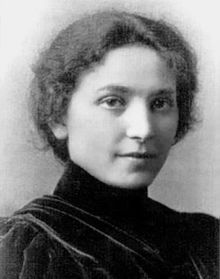Senda Berenson
| Senda Berenson | |
|---|---|
 |
|
| Born |
March 19, 1868 Butrimonys, Vilna Governorate, Russian Empire |
| Died |
February 16, 1954 (aged 85) Santa Barbara, California |
| Nationality | Litvak-Russian |
| Occupation | Teacher |
| Known for | Pioneering women's basketball |
Senda Berenson Abbott (March 19, 1868, Butrimonys, Vilna Governorate, Russian Empire to a Lithuanian Jewish family – February 16, 1954) was a pioneer of women's basketball, authoring the first Basketball Guide for Women (1901–07). She was inducted to the Basketball Hall of Fame as a contributor on July 1, 1985, the International Jewish Sports Hall of Fame in 1987, and into the Women's Basketball Hall of Fame in 1999.
She modified existing men's basketball rules for women in 1899.
Abbott was the sister of the art historian Bernard Berenson and a great-great-aunt of the photographer Berry Berenson and the actress and model Marisa Berenson.
Senda Berenson was the first person to introduce and adapt rules for women's basketball to Smith College.
Born as Senda Valvrojenski, she immigrated to the United States when she was seven years old. Her parents were Albert and Judith Valvrojenski. When Senda was born, she had an older brother Bernard. She would later have another younger brother and two younger sisters. Albert Valvrojenski grew up following an educational track of classical Jewish learning and at one time contemplated becoming a rabbi. However, he gradually became a practitioner of Haskalah, a European movement which advocated more integration of Jews into secular society. However, after his home and lumber business were burned to the ground, he lived with his in-laws, who were more traditionalist. He enrolled his son Bernard with a Hebrew and Aramaic tutor, under this pressure. He decided to move to the United States, where he could raise his family according to his own beliefs. He moved alone to the United States in 1874, locating in the West End of Boston. He became a "poor peddler of pots and pans", selling his wares in local towns near Boston. Albert changed his surname to Berenson soon after his arrival, as part of his "Westernization". He worked hard for months, and then sent for his family in 1875.
...
Wikipedia
